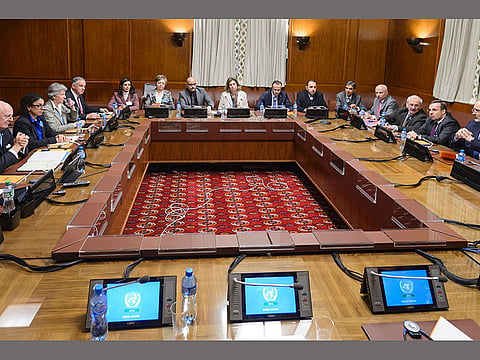Geneva process is long and unpredictable
Syria’s conflict is mercilessly driven by so many players whose long-term strategic goals are often worlds apart

Wars, generally speaking, are unpredictable — particularly when one is attempting to foresee when they will begin and how they will end. The war in Syria (or the war in Yemen for that matter) is no exception.
With the Geneva talks over Syria in progress, the road to a final agreement will prove arduous and painfully difficult. Therefore, predicting what may bring this conflict to an end will most certainly require an intelligent analysis and close understanding of the various interests of the numerous key local, regional and global players influencing this tragic war.
There is general agreement that for the Geneva talks to firmly establish a cohesive start, it will take quite a long time. Equally understood is that for the process to reach its desired conclusion, it would take even longer.
The peace negotiation following the Vietnam War in the 1960s, took longer than five years to reach an agreement. In what was known then as the Paris Process, the negotiation that led to the Peace Accords began in 1968 after various and lengthy delays. The accords, to establish peace in Vietnam, were eventually signed on January 27, 1973, between the North and South Vietnamese governments, as well as the US administration of President Richard Nixon.
Many would tend to agree that Syria’s conflict is much more acute and complicated than the Vietnam War. Though the later was a result of many conflicting elements, the direct US military presence in the country being the major one. Unlike the Vietnam War, Syria’s conflict is mercilessly driven by so many players. It is a war by proxy of an exceptionally rare nature and as a result, the number of players involved makes the talks so unpredictable and vague. The participants in this bloody and ugly war so far seem to be interested only in responding to provocation by a senseless escalation of their own.
This is what happened nearly five years ago when Syrian President Bashar Al Assad’s security forces viciously responded to a very peaceful civil protest in the southern Syrian city, Dara’a. Both Iran and Turkey have taken the war to new levels, tearing Syria apart through the use of their proxy armies.
With Russia directly joining the war in 2015 to shore up the regime’s position and US-led coalition air strikes targeting Daesh (the self-proclaimed Islamic State of Iraq and the Levant) strongholds, the war has led to the loss of more than 270,000 Syrian lives while displacing an estimated 11 million people — nearly half the population — within and outside the country. Therefore, the real questions as the Geneva talks begin centre on whether the participants in this war will show willingness to end it and how the conflict will end.
New ceasefire format
But a new format of ceasefire, brokered and guaranteed by the regime’s backers in Tehran and Moscow, may lead to a surprising result. Neither Russia nor Iran can afford a prolonged war in which their vital economic and financial resources are endlessly sapped. The rapidly falling oil prices puts both countries at risk.
Last November, supporters of the Al Assad regime, along with the five permanent members of the UN Security Council and rebel groups all pledged to facilitate peace negotiations and arrange for a ceasefire with the view to leading the country out of its misery towards a political solution.
Now, with the warring sides beginning another round of peace talks that have been called by Staffan de Mistura, the UN special envoy for Syria, it is expected that a ceasefire will top the agenda. It should not surprise anyone if the talks were to fail repeatedly before seriously taking off, and we equally should be prepared to see the talks stretch, much in the same manner that the Vietnam peace talks did.
What makes the talks unpredictable and complex are the differences between the warring participants. Despite the fact that Russia and Iran may have common geopolitical interests in the short term, their long-term strategic differences are much more important. Though they both see Daesh as a common enemy in Syria and Iraq, they don’t necessarily see eye-to-eye on the role of Hezbollah in both Syria and Lebanon. Russia, as a self-proclaimed global power, unlike Iran, has established a physical presence in Syria as part of its overall global strategy from the Arctic to Ukraine, as well as the warm waters of the Mediterranean.
Meanwhile, the US and its western allies view with suspicion Iran’s attempts to destabilise Gulf countries.
But with the newly-found situation in Iran in the wake of the nuclear deal, many hope Tehran will now focus its resources on rebuilding its economy after years of isolation and boycott.
However, it is too early difficult to predict how regional and global players will calculate their next moves after the Geneva talks get up and running.
Mustapha Karkouti is a former president of the Foreign Press Association, London.



